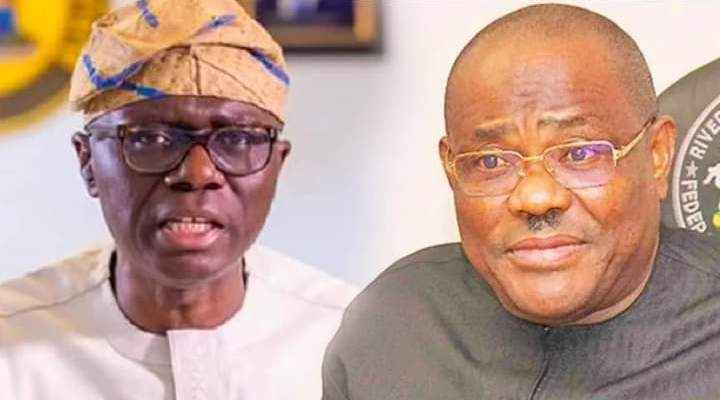
The Rivers and Lagos state governments failed to persuade the Court of Appeal in Abuja on Thursday to cease collecting Value Added Tax (VAT).
The court denied the two states' legal teams' oral motions for a restraining order against the FIRS.
Refusing to approve the petitions, a three-member court panel chaired by Haruna Tsanami instructed the attorneys for the two states to file official applications rather than oral submissions.
The FIRS had appealed the Federal High Court's decision in Port Harcourt allowing the Rivers State administration to collect VAT.
Last Friday, the Mr Tsanami-led panel ordered the parties to the dispute to retain the status quo, a decision Rivers and Lagos attempted to reverse on Thursday.
The court had also postponed the hearing of a motion by Lagos State, which was not yet formally a party to the litigation, to be added as a respondent to the FIRS appeal until Thursday (today).
Lawyers clash
At Thursday's hearings, the legal teams for Rivers and Lagos states sought a restraining order against the FIRS.
The attorneys on both sides of the aisle engaged in heated back-and-forth about the prayer.
Rivers and Lagos legal teams, led by Ifedayo Adedipe and Moyosore Onigbanjo, respectively, sought for a "preservative injunction" prohibiting the FIRS from collecting VAT and distributing the profits to states until the outcome of the substantive appeal.
“My Lords, the appellant (FIRS) collects VAT and distributes it to the federation's states. “As a result, if it is not stopped, and the court finds its action unconstitutional, it will be difficult to recover the VAT proceeds that must have been distributed to the states,” said Mr Adedipe, a Senior Advocate of Nigeria (SAN).
The similar line of argument was used by Mr. Onigbanjo, the Attorney-General of Lagos State and SAN.
According to him, if FIRS is not stopped from collecting VAT and distributing it among the federation's states, and the court deems its behavior to be inappropriate at the end of the day, "it will be impossible to retrieve the VAT revenues that must have been squandered."
In response to the oral request by Rivers and Lagos attorneys, FIRS counsel Mahmud Magaji, also a SAN, criticized his opponents' claims in a hostile tone.
“My Lords, I believe my learned colleagues are trying the patience of the court when it is apparent that their application has no basis,” Mr Magaji said, adding that the Lagos government lacked the authority to make such a request because it had not yet been joined as an interested party.
This submission enraged Mr Onigbanjo, who had intended to respond to Mr Magaji had it not been for the intervention of a member of the Appeal Court panel, who advised the FIRS lawyer to "display a greater sense of decorum in addressing his colleagues."
The leader of the appeal panel, Justice Tsammani, encouraged the respondents' attorneys to make a formal request in response to their concerns in their answers to the request.
Lagos joinder application
Earlier, Mr Onigbanjo, in filing the joinder motion for Lagos State to be joined as a respondent to the FIRS appeal, informed the court that the decision of the appeal would have an influence on the state.
The Attorney-General requested that the court join the Lagos State administration.
Lagos State had to request to be joined as a party to the appeal since it was not a party to the case before the Federal High Court that resulted in the FIRS's challenge to the verdict.
Similarly, Mr Adedipe, counsel for the Rivers State administration, did not object to the joinder motion from Lagos State.
Mr Magaji, the FIRS lawyer, however, fiercely rejected Mr Onigbanjo's plea.
“The applicant's (Lagos State government) joinder application is flawed from the start.
“Section 243 (1A & B) of the Constitution does not sustain a joinder application in this case,” Mr Magaji explained.
He further claimed that the Lagos State government was not a party at the trial court in Port Harcourt, and that “the Federal High Court in Port Harcourt never referenced the applicant.”
In addition, in objecting to the Lagos government's request to be joined as a party, the FIRS counsel claimed that the state had already filed an appeal in the Supreme Court over the VAT issue, which Mr Onigbanjo quickly refuted.
The Lagos Attorney-General informed the appeal court that the litigation referred to by Mr Magaji in his argument concerned stamp duty collection rather than VAT, and that it involved all 36 states of the nation.
Mr. Onigbanjo also disputed the appellant's (FIRS) allegation that the Lagos State government was never referenced in the trial court's decision.
“In its judgment, the Federal High Court in Port Harcourt found that it was illegal for the FIRS to collect VAT, therefore authorizing the 36 states of the federation, including Lagos,” Mr Onigbanjo said.
The Court of Appeal has reserved its decision.
The court postponed its decision on the joinder application filed by the Lagos State administration.
As soon as the ruling is available, a date will be informed to the parties' counsel.
